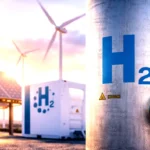Electric Vehicles are a key technology in transitioning to a sustainable, low-carbon transportation system. This article discusses electric vehicles, their importance, the latest trends, and the global market.
What is an Electric Vehicle (EV)?
An electric Vehicle (EV) uses one or more electric motors for propulsion instead of an internal combustion engine (ICE). EVs are powered by electricity stored in rechargeable batteries, which can be charged from an external power source such as a charging station or a household outlet.
Two main types of electric vehicles are battery electric vehicles and plug-in hybrid electric vehicles. Battery electric vehicles (BEVs) rely entirely on electric power and have no backup ICE. In contrast, plug-in hybrid electric vehicles (PHEVs) have an electric motor and an ICE that can kick in when the battery runs low. Some EVs also use regenerative braking to recharge their batteries by converting the kinetic energy from breaking into electrical energy.
Electric vehicles offer several benefits over ICE vehicles, including reduced emissions, lower fuel costs, and quieter operation. They also face challenges such as limited driving range and availability of charging infrastructure. As technology advances, EVs become an increasingly popular alternative to traditional gas-powered cars.
Why are Electric Vehicles Important?
Electric vehicles are an important tool for transitioning to a more sustainable and minimized carbon transportation system and can help address some of the world’s biggest challenges today. Some of the reasons are given below.
Reduced Emissions
EVs produce significantly lower greenhouse gas emissions than traditional gasoline or diesel vehicles, which can help reduce air pollution and combat climate change. The global shift towards EVs represents a significant opportunity to reduce greenhouse gas emissions and address some of today’s biggest challenges.
Energy Efficiency
EVs are more energy-efficient than traditional ICE vehicles, which means they can travel further on the same amount of energy, which helps reduce dependence on fossil fuels and save consumers money on fuel costs. The energy efficiency of EVs is an important factor in their growing popularity. As battery technology improves, EVs will likely become even more efficient.
Renewable Energy Integration and Economic Development
EVs can be powered by renewable energy sources, especially solar or wind power, which can help reduce reliance on non-renewable energy sources like coal and oil. The transition to electric vehicles creates new job opportunities in the manufacturing, infrastructure, and service sectors, contributing to economic development and growth.
Noise Reduction and Improved Public Health
Electric motors are much quieter than ICE engines, making EVs a more pleasant and peaceful form of transportation. EVs can help reduce air pollution, improving public health by reducing respiratory and cardiovascular diseases associated with air pollution.
Electric Vehicle Latest Trends
The EV industry is seeing rapid growth and innovation, and these trends are expected to continue as the transitions to a more sustainable and low-carbon transportation system. Some of the latest trends are given below.
Increasing Range and Commercial Fleets
Battery technology is improving, and automakers are pushing to increase the range of EVs to make them more competitive with traditional ICE vehicles. Some EVs now have ranges of over 400 miles on a single charge. Businesses increasingly adopt EVs for their fleets, particularly for short-haul delivery and logistics. This trend is expected to continue as the cost of EVs decreases, and the range improves.
Increased Investment and Infrastructure
Investors are pouring money into the EV industry, particularly in battery technology, charging infrastructure, and autonomous driving technology. The availability of charging infrastructure is a key factor in EV adoption. Governments and private companies are investing in expanding charging networks to make it easier for drivers to recharge their vehicles.
Variety of EV models
As the EV market grows, more automakers are entering the space and offering various models, including passenger cars, trucks, buses, and even airplanes. The latest trend in the electric vehicle (EV) industry is the increasing number and variety of EV models available. As the technology matures and more automakers enter the market, there is a growing diversity of EVs available to consumers.
Integration with Smart Grids
EVs can serve as a mobile energy storage solution and be integrated with smart grids to help balance energy demand and supply. The integration of EVs with smart grids is an important trend in the industry that has the potential to improve energy efficiency, reduce greenhouse gas emissions, and save consumers money on their energy bills.
How are Growing Global Electric Vehicle Markets?
Data Bridge Market Research said the global Electric Vehicle (EV) Market value was USD 280.2 Billion in 2021. It is expected to reach USD 1566.3 Billion by 2029, with the market growing at a Compound annual growth rate (CAGR) of 24.0% from 2022 to 2029.
The major global Electric Vehicle (EV) market players are Ford Motor Company, General Motors, AUDI AG, Kia Motors Corporation, Tesla, Groupe Renault, Groupe PSA, SAIC Motor Corporation Limited, Daimler AG, BMW AG, Hyundai Motor Company, BYD Company Ltd., Continental AG, TOYOTA MOTOR CORPORATION, Nissan Motor Co., LTD., Volkswagen AG, AB Volvo, and Honda Motor Co., Ltd.
Conclusions
Electric vehicles offer many advantages over traditional gasoline or diesel vehicles, including reduced emissions, increased energy efficiency, improved public health, and economic benefits. There are still challenges to overcome, but the continued growth and innovation in the EV industry is a positive step towards a more sustainable and low-carbon future.
As technology advances and battery range and charging infrastructure improves, EVs become an increasingly viable alternative to traditional vehicles. Automaker companies invest heavily in EV technology, and governments and private companies are expanding charging infrastructure and battery technology.





